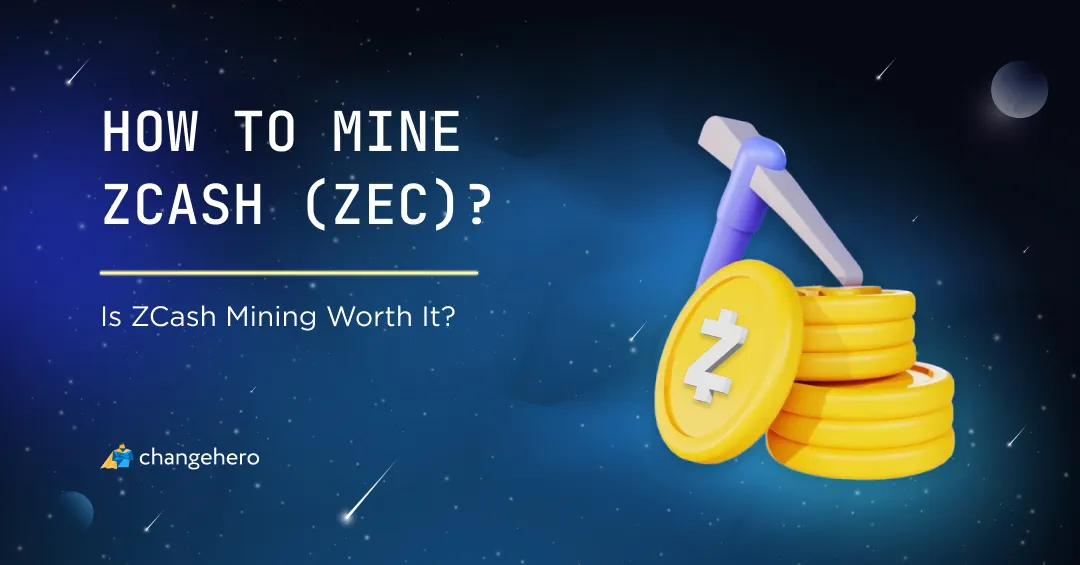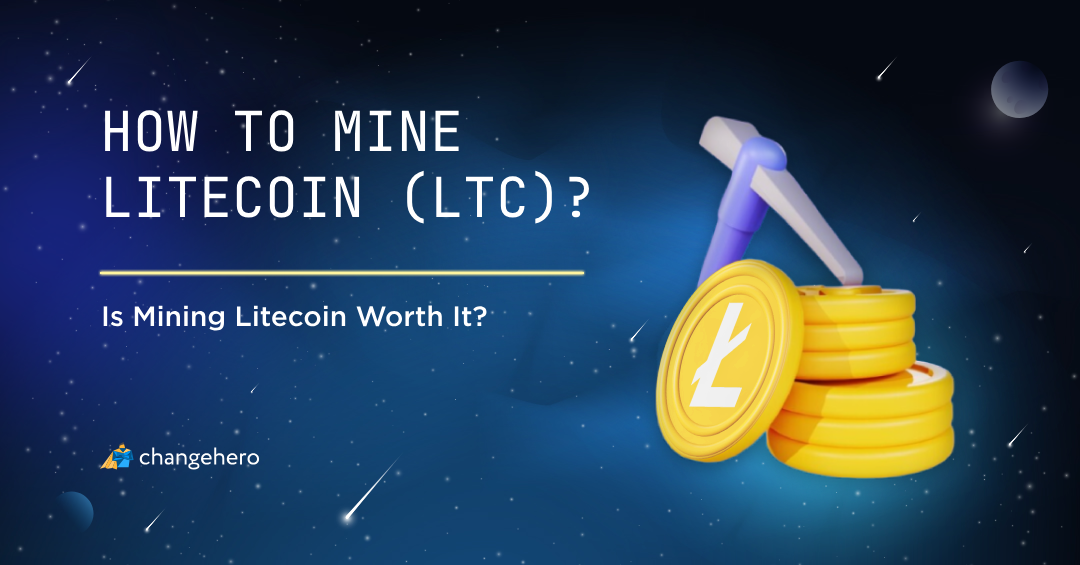Even those who sit idly on their crypto holdings eventually reap profits but luckily, waiting for years for a bull run is not the only way to get passive crypto income. The ChangeHero team will review the most popular methods to generate passive income with crypto and provide tips for each of them.
Key Takeaways
- Passive income refers to the money earned with no active ongoing involvement, such as interest on savings or royalties. It is possible to earn it with cryptocurrencies through various means, too.
- The benefits of using crypto to make passive income are its potential for high returns, relative accessibility, and flexibility. At the same time, risks include the lack of investor and consumer protections, regulatory uncertainty, and high volatility.
- There are dozens of methods to generate passive income from crypto, ranging from well-known ones like staking and mining to more exotic ones like play-to-earn and airdrop hunting.
Brief Intro to Crypto Passive Income

It is not a secret that a lot of people dive into the crypto world searching for additional ways to earn money. That includes earning passive income: money earned with little to no ongoing effort from the recipient. Classic examples of passive income are savings accounts and royalties. They typically require some effort, especially at the start, but if everything works out, little to no active involvement is required.
Cryptocurrencies have proven to be a valid resource to set up passive income. Even simply holding Bitcoin or altcoins until they shoot up in value brings profit in the long term. However, this works both ways, and buying at the top can cause your investment to depreciate for years.
The crypto industry has developed multiple financial products that emulate or even supercharge existing financial instruments. So naturally, there are tons of ways to set up passive income in cryptocurrency.
For example, individuals can stake their cryptocurrency holdings to help validate transactions on the blockchain network and earn rewards in return. Similarly, they can lend out their digital assets to others in exchange for interest payments. These passive income opportunities leverage the unique properties of cryptocurrencies, such as blockchain technology and smart contracts, to automate income generation processes.
Pros and Cons of Turning to Passive Income from Crypto

Before diving into the specific ways of generating passive income with crypto and picking apart their own perks and pitfalls, let’s review the pros and cons of it in general. After all, despite crypto passive income being popular, it does not mean it is perfect.
High Returns Potential
A competitive advantage of crypto products over more traditional methods is their decentralized nature. Thanks to blockchain technology, the middleman is often not necessary, cutting out the cost of their services from the equation. As a result, crypto lenders can offer higher interest rates and even programmatically adjust them in tune with supply and demand.
Be wary of offers that promise exorbitant returns: in the best case, the rewards are printed as supply inflation, reducing the value of your holdings even as the number goes up. In a much worse case, you can end up giving up your funds to a honeypot or a not-so-decentralized Ponzi scheme.
Abundance of Passive Income Opportunities
The crypto industry is yet to catch up with traditional finance in the sheer number of ways of generating passive income but it is getting there! In the few years that decentralized finance (DeFi) has been around, it has already seen thousands of protocols for all purposes spring up. The speed at which this sector moves ensures that every other week a dozen more DeFi products become available.
Portfolio Diversification
An investment portfolio refers not only to the assets in your possession but also to the work you put them to. Hedging against volatility or inflation is a way to safeguard your portfolio from losing value. Why shouldn’t it apply to crypto assets? Use the available passive income generators to make sure in a few years it is worth more than what you started with.
Accessibility
The decentralized nature of cryptocurrencies also allows for another benefit: as long as you have an Internet connection, you can take advantage of the crypto market for passive income. Of course, some methods come with additional requirements, such as personal identification or regional restrictions. Nevertheless, crypto remains more inclusive than traditional finance due to a lack of things such as investor accreditation or credit scores.
High Volatility
The high returns in crypto come from its increased volatility, which also amplifies losses. Missing an opportunity to cash out may leave you unable to reap the profits for a long time. Therefore, due to the unstable nature of the value of cryptocurrencies, it is far from a perfect fit for a passive income strategy.
Regulatory Uncertainty
Dedicating some part of your investments to crypto is fine as long as you have confidence that you will be able to use it. Banks in Canada, Argentina, Russia, and Taiwan will not deal with crypto. China, Bolivia, Algeria, and Egypt outright banned all cryptocurrencies. Even if the current stance of your country regarding crypto is more or less clear, your crypto savings might be a crackdown away from becoming unavailable.
Technological Risks
Despite what crypto enthusiasts say, the user experience of crypto services is still far from perfect. To start with crypto, you will need to learn a lot of basics from the get-go. Even experienced users are not 100% safe from falling for a scam or clicking the wrong link. Due to the nature of crypto and blockchain, the chances of funds recovery or reversing a fraudulent transaction are slim.
No Investor Protections
Forget about FDIC insurance or external accountability for crypto projects’ leadership. The lack of censorship and oversight comes with the lack of benefits provided on the government’s level. Users of a failed exchange FTX should receive compensation due to the U.S. government intervention but it is a whole other story for those who had Bitcoin on Mt.Gox. This exchange closed its doors due to a lengthy exploit in 2014, and the creditors started receiving payouts in late December 2023.
The Best Ways to Generate Passive Income with Cryptocurrencies

Now that you more or less have an idea of what you are thinking of getting into, let’s review the most popular methods that crypto users avail of to earn passive income.
Staking
At the top of the list is staking, the process in which users hold and lock their cryptocurrencies in a wallet to support the network’s operations. Technically, staking and Proof-of-Stake were designed as consensus mechanisms first and passive income generators second. Some networks even try to distance themselves from the promise of giving returns to validators (so as not to get into the crosshairs of regulators).
In return, stakers earn rewards in the form of extra coins: either network fees, emissions, or both. Staking helps secure the blockchain network and is a prerequisite to validate transactions. It is also a way for investors to earn passive income by participating in the governance of the network.
Staking typically requires users to set aside a minimum amount of coins (for example, 32 ETH) and maintain a stable Internet connection. The rewards can vary based on factors like network participation and coin supply. It’s a popular method for earning passive income in the crypto space.
The most popular proof-of-stake coins are Ethereum (ETH), BNB, Solana (SOL), Cardano (ADA), and Avalanche (AVAX). In addition to running a validator node and solo staking, alternatives that make it more accessible or let you supercharge the stake are available.
Mining
Yes, mining is also a way to generate passive income with crypto in 2024 as well! Crypto mining is the process of validating and adding new transactions to a blockchain by solving complex mathematical puzzles. Miners use high-powered computers to compete with each other to solve these puzzles first and secure the network. When a miner successfully solves a puzzle, they add a new block to the blockchain and receive newly minted coins as a reward (plus the transaction fees).
Mining indeed requires more initial investment and ongoing involvement than staking. The days of mining crypto profitably on your home PC are long gone but if you are not aiming for Bitcoin, setting up a farm on-budget or joining a mining pool is possible.
Bitcoin (BTC) remains the most popular Proof-of-Work cryptocurrency but as we have said, mining it is an industrial affair. According to What To Mine, Flux (FLUX), Ravencoin (RVN), and Firo (FIRO) are all quite profitable to mine.
Lending
As the name implies, crypto lending involves lending cryptocurrency to others in exchange for interest payments. Lenders provide their digital assets to borrowers who use them for various purposes, such as trading or leveraging. In return, lenders receive interest on the lent amount.
This practice allows crypto holders to earn passive income on their assets while providing borrowers with access to liquidity. Platforms facilitate these transactions, ensuring security and managing the lending process. Crypto lending remains a popular way to earn returns on idle assets in the digital currency space.
The top lending and borrowing platforms in crypto as of 2024 are Maker (MKR), Aave (AAVE), and Compound (COMP). Smaller lending platforms may offer higher returns and more attractive conditions, so they are also worth checking out — after assessing the risks.
Liquidity Provision
If there are DeFi protocols that facilitate sharing liquidity with borrowers, you can already guess that similar mechanisms exist for decentralized exchanges (DEX). Another way of generating passive income from DeFi is liquidity provision: supplying assets to a market or platform to facilitate trading activities.
Like with staking or mining, you are providing the protocol with a service for a reward. In this case, your service is the liquidity you lock in the liquidity pool and the reward is trading fees and other incentives.
For instance, a protocol may reward you in its native currency, as Uniswap (UNI) does, as opposed to the currency you deposited. Sometimes, it turns out to be a more profitable scenario, and traders that engage in this activity call it liquidity mining.
In addition to Uniswap, you can contribute to liquidity pools on PancakeSwap (CAKE) and SushiSwap (SUSHI) for similar rewards.
Yield Farming
In DeFi, you are not limited to a single method of earning passive income. Some risk-taking traders even seek out the optimal strategies to make the most out of staking or locking up cryptocurrencies in various protocols to earn rewards. Engaging in yield farming implies a more proactive approach to income generation, akin to trading but a smart setup can carry you for a while. Nevertheless, should you go for this approach, do not neglect oversight since it involves risks and nuisances such as impermanent loss, margin calls, and smart contract vulnerabilities.
In addition to the lending protocols and DEXs we discussed above, you can engage in yield farming in Curve (CRV), yearn.finance (YFI), Venus (XVS), and Balancer (BAL).
Interest-bearing Accounts
And now, from the Wild West of DeFi to something even more familiar. If you do not look for sophisticated financial instruments and would like to open, let’s say, a savings account but with crypto, you can do it!
Some popular platforms that offer crypto savings accounts include centralized exchanges Coinbase and Crypto.com, as well as DeFi products like Nexo. These accounts allow you to earn interest on your deposited cryptocurrencies, similar to how traditional savings accounts work with fiat currencies.
Dividend-Earning Tokens
As the name suggests, a dividend-earning token is a cryptocurrency that works like a dividend-earning stock. It provides holders with a share of the project’s profits or revenues. By holding these tokens, investors can earn dividends in the form of additional tokens, rewards, or other benefits based on the performance of the project. Dividend-earning tokens are designed to incentivize token holders to participate in the ecosystem and share in the success of the project.
Keep in mind that cryptocurrencies do not have cash flow in the normal sense of the word. The rewards for holding such tokens often come in the form of newly issued tokens, inflating the total supply. A more seemingly healthy model is redistributing transaction fees but in practice, it does not incentivize network activity.
Nevertheless, there are plenty of dividend-earning coins with various tokenomics. Coins like NEO and VeChain (VET) reward holders with gas tokens that are necessary to use the respective networks. Exchange tokens like KuCoin Token (KCS) and BitGet Token (BGT) offer rewards sourced from the respective crypto exchanges’ revenue.
Referral programs and affiliate links

Another non-crypto native method of earning passive income is affiliate programs. These marketing initiatives are offered by cryptocurrency companies to incentivize individuals or businesses to promote their products or services in exchange for commissions or rewards. Participants, known as affiliates, earn a commission for each customer they refer who makes a purchase or completes a specified action.
These programs are popular in the crypto space and are used by exchanges, wallets, trading platforms, and other crypto-related services to drive user acquisition and increase brand awareness. Affiliates can leverage their online presence, such as websites, social media channels, or newsletters, to promote the products or services and earn passive income through referrals. Successful affiliate marketers in the crypto space can generate significant revenue by effectively promoting and driving conversions for the companies they partner with.
Do you know that you can earn Bitcoin with ChangeHero’s affiliate program? In addition to referral links, you can also install our exchange widget on your website or use the ChangeHero API to integrate the instant swaps in your app or product. Get in touch with us to register as an affiliate partner!
Crypto Games
Blockchain technology and smart contracts helped usher in the types of games and apps that let their users earn digital currencies. The games developed under this premise became labeled as “play-to-earn” (P2E). Play-to-earn games reward players with cryptocurrencies or digital assets for engaging with the game and completing various in-game activities. Depending on the type of P2E game, getting in early may prove to be even more profitable than actively playing it.
The best-known P2E success story is Axie Infinity (AXS). Other well-known projects include metaverses The Sandbox (SAND) and Decentraland (MANA), and ecosystem tokens Gala (GALA) and Enjin Coin (ENJ).
Airdrop Hunting
Last but not least, this activity involves actively seeking out and participating in cryptocurrency airdrops, which are distribution events where new tokens or coins are given away for free to holders of a particular cryptocurrency or to individuals who complete specific tasks. Airdrop hunters typically monitor various platforms, social media channels, and websites to discover upcoming airdrops and then participate in them to receive free tokens.
While airdrop hunting can lead to acquiring free tokens or coins, it is not always a reliable source of passive income. The value of airdropped tokens can vary greatly, and there is no guarantee that the tokens received will appreciate or be tradable on exchanges. Additionally, participating in airdrops often requires time and effort to complete tasks or meet specific requirements set by the project conducting the airdrop.
Airdrop hunting may not always fit the traditional definition of passive income but it can be a fun and potentially rewarding activity for crypto enthusiasts.
Conclusion
Knowing how passive income can be made in crypto is only the first step to more extensive research and getting to action. However, it is still an important step to making your digital assets work for you without the risk of losing it all.
Do you find these tips helpful? Let us know in the comments on our blog or social media: Twitter, Facebook, Reddit, and Telegram.
Frequently Asked Questions
Can crypto make you passive income? Can you make passive income with cryptocurrency?
Plenty of crypto investors turn to these assets for passive income. Cryptocurrency can potentially generate passive income through staking, lending, yield farming, and participating in liquidity pools.
Can I make $100 a day from crypto? Can you make $100 a day with crypto?
Generating $100 a day from crypto is achievable through trading, investing in high-yield opportunities, or providing services in the crypto space. High-yield opportunities in question may include staking, yield farming, or participating in initial coin offerings (ICOs) with high potential returns. Bear in mind that high returns often imply both significant initial investment, commitment, and a high degree of risk.
Is crypto mining a good passive income?
Crypto mining can be a good passive income stream, but it requires significant upfront investment in mining equipment, electricity costs, and ongoing maintenance. Additionally, factors like the price of cryptocurrencies, mining difficulty, and hardware efficiency can impact profitability. It’s important to carefully research and consider these factors before getting into crypto mining as a sustainable passive income source.
Which coin is best for passive income? What is the best crypto to make money? What is the best crypto to make a profit?
Choosing the best cryptocurrency to invest in for making money depends on various factors such as your risk tolerance, investment goals, and market conditions. Some popular cryptocurrencies for potential investment opportunities include Bitcoin, Ethereum, BNB, Cardano, and Solana. It’s essential to conduct thorough research, consider market trends, and seek advice from financial experts before investing in any cryptocurrency.
Can you realistically make money with crypto?
Yes, it is possible to make money with cryptocurrency investments. However, it’s important to note that investing in cryptocurrencies comes with risks, including price volatility and regulatory uncertainty. Success in cryptocurrency trading or investing requires a solid understanding of the market, risk management strategies, and the ability to stay informed about industry developments.
Disclaimer
This article is not a piece of financial or investment advice. When dealing with cryptocurrencies, remember that they are extremely volatile and thus, a high-risk investment. Always make sure to stay informed and be aware of the risks involved. Consider investing in cryptocurrencies only after careful consideration and analysis of your own research and at your own risk.








